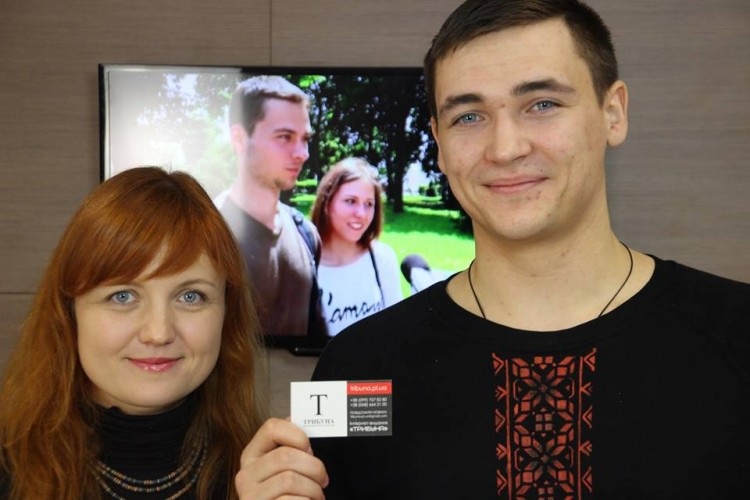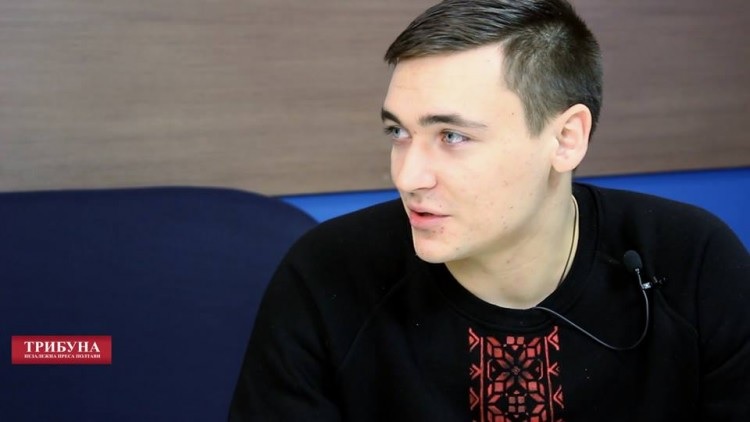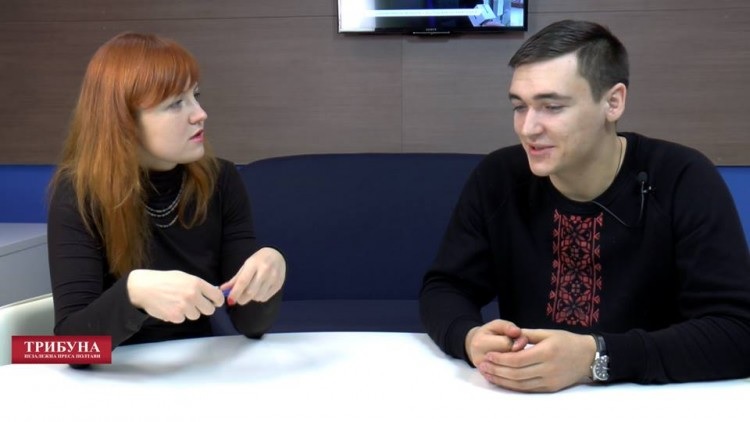In Yurii Dmytrenko’s presence – ATO veteran, sportsman, activist of NGO “Poltava platform” – you feel at ease even on initial acquaintance. It is easy to discuss complicated issues with him: how to survive after being severely wounded, how to overcome self-pity and how to stand firmly on the ground even when life “trips” you. When Yurii was 20 years old, he went to the contact zone as a volunteer. A year and a half later, having stepped on a mine, he lost his left leg. And six months later, he took part in a cross-fit competition among healthy sportsmen. He was the only one there with an amputated leg.
Yurii, how did the decision to go to war emerge?
I made the decision to defend Ukraine right after the Russians annexed the Crimea and after the first battles in Donbas broke out. I did not do this earlier because I was a student of the 4th course at our technical university back then and at the same time I was completing training in the military department. We thought we would be sent to the frontline. Perhaps some of the students feared this, but I hoped it would happen. However, we were not sent anywhere and that is why I decided not to wait until I would be given a military rank. I contacted a volunteer battalion, which was then under the guidance of the Ministry of Defence of Ukraine. In August of 2014, I signed a contract with the 54th separate reconnaissance battalion and in September that year I was forwarded to the ATO zone.
How did your relatives and parents react to your decision to go to war?
I lied to my parents for a month, saying that I was visiting a friend in Ternopil or that I was away on a business trip. When they eventually found out that I had joined the army, I reassured them that I was doing military service in the sphere of my military qualification/training: radio technical troops as part of Air Defence Troops. My parents understood that there is no need to be in the ATO area to perform that kind of duty, that air defence systems could be located about 200-300 km away from the combat action zone. I told them that we were garrisoned near the north border, near Belarus. This lasted for about half a year. But when I returned home for my vacation, it became clear that I was in the ATO zone the whole time. My military ticket and my appearance said it all. Naturally, my parents were worried but they bore with all my decisions, both then and later on.
You fought for a year and a half prior to being wounded. You were in many parts of the ATO zone: near Mariupol, then near Bakhmut, Pervomaisk and Zaitsevo. The unit in which you served made repeated raids into the so-called “buffer zone”. How well do you remember the battle when it all happened?
Back then, our battalion returned to the Mariupol area, we were stationed near Hnutovo. Our task was to surveil and patrol the buffer zone. One day, a group of our warriors, which was conducting a raid into the “buffer zone”, fell into separatists’ ambush. One of the guys managed to contact us by mobile phone: he reported about the ambush and that two of our warriors were wounded. A group of us, there were about five men, went to rescue them. I, as a reconnaissance-gunner, had to cover the guys. When the distance to the enemy was 100-200 meters, a battle broke out. I moved a bit to the side, to attack by fire from a more convenient angle. I stepped off the path and that’s when I tripped a mine.
Do you consider it a miracle that you survived?
I do not consider it a miracle. The skills gained during our training, including medical ones, helped me most of all. If I had not been able to help myself, no miracle would have saved me. The guys from my unit were far away, about 50-100 meters, they were unaware that I had tripped a mine. There was a battle going on, and amidst combat actions one really does not hear what is happening around.
You realized that you have no leg on the battle field. Did you feel some sort of despair later on, when you were in hospital?
I must have missed it (laughs). I felt no despair, but there were many questions, what will I do now. I asked the medical staff in Dnipro about the amputation, about artificial limbs. But they could not recommend anything because they themselves had very limited knowledge about these issues. It was not until I arrived to Kyiv, that both doctors and volunteers as well as guys who had amputations and were already using artificial limbs – all of them communicated with me, encouraged me, told me what to do and the best way to get it done. I understood that I would not have any problems with getting an artificial leg. There was no need to raise money, or panic, – the state covers these costs. I could lie down and rest, and basically, that is what I did for two months. In general, my acquaintance with guys who have similar injuries helped me a lot. They were able to walk well, they did not limp – it meant that I will be able to walk in such a way. And the support from volunteers meant a lot. Oftentimes the ward’s door did not close at all, and I was even angry that sometimes I had no possibility to rest. But indeed, you are never left alone with your problems, all the time you are taken out by somebody: to concerts, some sort of entertainment. I refused to receive material assistance from the start, because I understood that somebody needs it more than I do. But I received enough moral support.
How did “Games of heroes” (cross-fit competitions for warriors who lost a limb as a result of severe injuries) become part of your life? Did you go in for sports before the war?
As a student I attended sports sections. In the ATO zone we tried to keep fit when we got the chance: we found some barbells, dumb-bells and arranged a mini-gym for ourselves. At the end of spring, the creator of the project “Games of heroes” Yevhenii Koval came to the hospital and offered to train together with some other guys who had amputations as well. Back then, I did not even have an artificial limb, but I began the training. At first, we simply tried to get back into shape after being wounded. Full-fledged trainings began when I received an artificial limb.
Did “Games of heroes” project give you something in terms of morale?
This project has a lot to offer in terms of fitness, for rehabilitation purposes, to regain one’s physical form. But it also has a lot to offer in terms of morale and psychological rehabilitation, because you are constantly surrounded by like-minded people, guys who have the same disabilities and are thus able to give some advice. We feel free to chat, joke with each other as we please, because our jokes may seem strange or “black humor” to people who have no experience in what we have been through. All of this really helps to restore your psychological state. In general, one’s surrounding plays a great role in the life of a person, both at war and after being wounded. If your community is wholesome and solid, psychological problems will not be an issue.
Initially, “Games of heroes” was a demonstrative performance, because neither we, nor the project itself were ready for professional competitions. The objective of the first performances conducted in Kyiv was: to show people that we exist, we are no different from others, to follow the path of Europe and the USA regarding the rehabilitation of severely wounded warriors with amputations. However, from the very beginning a guy who had a hand amputation as a result of the Maidan events and another serviceman, who had not been to the ATO zone but also sustained a combat trauma, took part in the competition. In July of 2016, disabled people maimed in accidents or with civilian traumas already began to join the next competition in Kharkiv. However, most part of the participants - are wounded warriors.
“Games of heroes” rapidly transformed from demonstrative performances into the format of a contest. What was this caused by?
Neither the guys nor I liked the format of demonstrative performances, because it did not motivate in any way. The whole time, I wanted to prove to myself and other people that I am able to do more. That is why the event acquired come sports features: judges were appointed, points were given. We also do this for our team to enter the international sports scene. There is already an accord of our Ministry of Youth and Sports regarding participation in international competitions in spring, in which NATO’s warriors with artificial limbs (who received wounds while participating in peacekeeping operation) take part.
You became the second in the individual contest at the All-Ukrainian “Games of heroes”. Did you compare your results with the results of sportsmen without special necessities?
At the beginning of September, an international cross-fit competition was held on Sofiyia Square in Kyiv; there were more than one hundred sportsmen. Only my category – amateurs – included almost 3 hundred participants. I was the only one with an artificial limb, an invalid. My goal was to simply perform all exercises and go the distance. But I managed to get a place far from the last. I think the fact that a guy with an artificial limb outfooted them encouraged other sportsmen to train further.
You have your personal Facebook-project “#моянованога” (“#mynewleg”). What is the aim of it?
I did not have to come up with any ideas for this project. One day, my friends and I were walking around Lviv city. Oh, what a wonderful landscape, why not take a photo. And I thought, why take a photo of myself if I can take photos of my new leg? Since then I have been searching for interesting places or situations intentionally.
It is no secret that not all guys who were severely wounded at war, and not all people with severe wounds in general, manage to accept changes in their lives with ease. What do you do to avoid self-pity and prevent others from doing this? In my opinion, this gets in the way very much.
It really impedes very much, but I limit my circle of contacts. It does not include those, who see no light at the end of the tunnel, those who feel betrayed and miserable. This makes my life easier. Unfortunately, there are guys who like piling on the agony: “this will kill me, I have a prosthesis now”. My response to those guys is: “I tried this yesterday and it does not present a problem. You should try it several times, and then arrive at conclusions”. It is especially easy “to slide” into a self-pity mode when someone tends for you excessively, for example, volunteers. Some people do not want to make any effort towards self-improvement or even undergo treatment. They only want to whimper, do nothing and live on government disability payments. They become not only physical invalids but and “moral” ones. Perhaps this word is tactless, but I think that I have the right to use it.
You went to war as a volunteer, in other words, it was a conscious decision. You fought in an intelligence unit, and this branch (with no exaggeration), is the elite of the armed forces. Do you have a recipe for how to emerge from war and return to civil life? Because a lot of guys miss – not so much the war itself as - themselves in that state and the importance of events which occurred.
Yes, it is true, because, to a varying degree, this affects all guys who come back from war. Those guys who did not sustain severe wounds can now sign a contract. But for warriors, for example, who have amputation, it presents a problem. However, I know warriors who continue fighting with prosthesis and nothing impedes them. As for me, I’ve thought about going back, but I would like to take up my old post, the one I had before I was wounded: to fight as a reconnaissance man-machine-gunner. Because a post in the sector’s headquarters, and having to pretend that I am doing a very important mission, – this is not for me.
You laugh a lot. This kind of irony and even self-irony - what do you need it for?
I behave critically towards myself, and I think that I can be critical towards other people as well. And in the same manner, I’m all for being shown my vices. I like laughing at my problems. It makes it easier to find solutions.
Reference. Cross-fit – is a kind of dynamic training, based on interchanging of basic exercises from different kinds of sport (kettlebell lifting, heavy athletics, artistic gymnastics, canoeing, easy athletics and so on) that are performed with high intensity.


